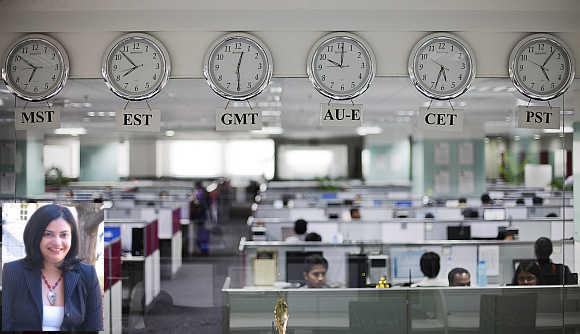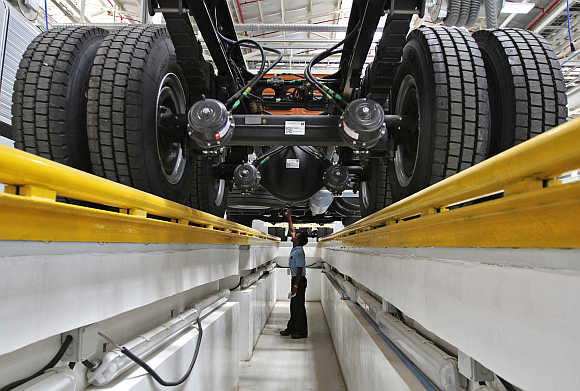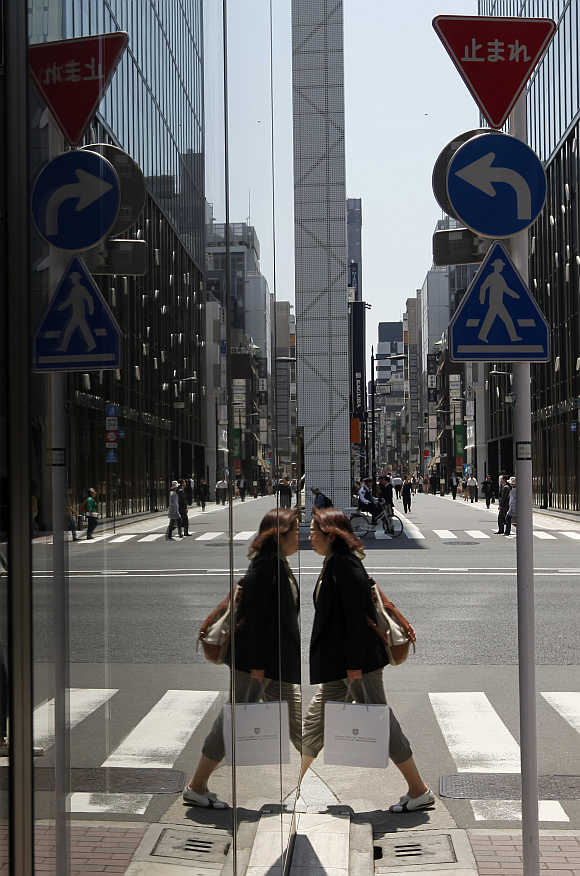 | « Back to article | Print this article |
India should make it easy to hire, fire workers
Foreign firms are reluctant to come to India because of labour regulations, says Anusha Chari, Associate Professor, Department of Economics, University of North Carolina at Chapel Hill.
Chari, who has taught at University of Michigan, University of Chicago's Graduate School of Business and Haas School of Business at Berkeley, says firing employees is a major issue in the country.
Foreign investors don't like policy uncertainty and reversibility, she tells Faisal Kidwai in a phone interview.
Here are the excerpts:
You have said that even after the implementation of economic reforms, the economy is still dominated by state-owned and traditional private firms. Do you expect it to change any time soon?
We have seen that change in the services sector. There are lots of new groups that have come up and that's because the sector wasn't subject to same kind of regulatory shackles as the manufacturing sector.
But, I don't see that change happening anytime soon in the manufacturing sector because labour regulations are such that foreign firms are reluctant to come in.
In India, you have a large number of small firms and a small number of large firms and that's very unlike in any country.
Click NEXT to read more...
India should make it easy to hire, fire workers
If you look at Chinese distribution, it's mainly dominated by large manufacturing and few small firms. And the reason for that is they are able to harness their labour abundance and have these giant factories where they can employ thousands of workers and it becomes cost effective whereas in India we run into all kinds of issues with hiring and firing workers if you get beyond a size of 10 workers.
So, what ends up happening is that Indian manufacturing has chosen to go on the direction of more capital intensive technology and which is ironic given that what we have in abundant supply is labour and primarily that's driven by that fact that if you hire somebody you cannot respond to demand shock or supply shocks by laying off workers.
So, who's going to employ? It's going to be government-owned and incumbent firms that are already in place, at least this is true in the manufacturing sector.
What are your other concerns about the Indian economy?
Foreign investors don't like policy uncertainty and policy reversibility. Things like retroactive taxes and one day saying you can come in and next day saying you can't come in - and you can see that in a whole bunch of sectors if you go industry by industry.
Click NEXT to read more...
India should make it easy to hire, fire workers
Given the fact that India is growing so fast, it is a very attractive destination, but foreigners can put their money in other emerging markets that treat them more fairly and where they don't have to worry about the fact that all of a sudden they are going to retroactively taxed.
They would rather go with a more certain policy environment than an uncertain one. The policy reversibility issue is a troubling factor in India. Given the way the current account deficit is being financed, it's basically by foreign portfolio equity flows and foreign direct investment, so if we want to continue to attract FDI and portfolio equity then there has to be more certainty.
Why do you think Prime Minister Manmohan Singh, who was instrumental in pushing through reforms in 1991, is finding it so difficult this time?
This is because of coalition politics and democratic setup. You see that happening in the US as well where President Barack Obama is trapped in his ability to do anything because of the Republicans. China has an authoritarian vision and they can do whatever they want. But in a democracy you have to content with these issues.
Click NEXT to read more...
India should make it easy to hire, fire workers
You have done extensive study on FDI in retail. Given the resistance in India, could you tell us the benefits companies, such as Walmart and Carrefour, will bring?
The benefit of Walmart and other big retailers is that they help tackle inflation. The evidence suggests that in the United States, depending on the type of good, there has been a significant decline in inflation that has been attributed to companies like Walmart because due to scale of their production and distribution network they are able to supply daily necessities pretty cheaply.
So, you see this effect on food prices in grocery stores in the US and that's had an overall effect on inflation. And that's clearly something that's a huge issue in India.
Walmart cuts prices by six to seven per cent for national brand goods and three to eight per cent for privately-held goods. If this starts to happen in India, then clearly you can see the benefit of having six to eight per cent reduction in India.
The other thing I have argued for is that in the US people tend to live in huge houses and drive long distances to go to big box stores and they buy for one month and keep in their extra fridge. Clearly, this is different from how things happen in India.
Click NEXT to read more...
India should make it easy to hire, fire workers
So, some of the arguments that have been made, such as small shops and retailers will go out of business, I am a little sceptical about that given the fact that in India people are so used to buying their grocery on almost a daily basis and the kirana guy is sending one loaf of bread and six eggs every day.
And people are used to living that way and the fact that refrigeration technologies, power outages, lack of extra fridge shortages make it difficult to store things in bulk. I think you have to be a little not so afraid of small stores going out of business.
What I also believe is that the firms are very good at building warehousing technologies and distribution systems, which could really help to improve the supply chain in India, especially for agricultural produce.
In my paper, I have talked about the fact that India is the world's second-largest producer of fruits and vegetables after China, producing about 180 million tons per year and official estimates are that 25-30 per cent of this produce goes waste between harvest and consumption.
Click NEXT to read more...
India should make it easy to hire, fire workers
So, if Walmart comes in, it's in their interest to build up this infrastructure and distribution system and encourage wholesale trading, which will help farmers as well as consumers.
The farmers get better prices and consumers get lower prices because it will reduce wastage and also eliminate the middle men who basically add on to the prices. If you see, what the farmers get is a fraction of what the consumers pay for it and it basically goes to the middlemen.
The interesting thing that has happened in China, and this could very well happen in India as well, is that if they are not able to sell the goods to the local market they can still use that agricultural production for export purposes. A side benefit of big retailers building distribution and warehousing channels could also mean that India would have improved agricultural exports, which is a big benefit.
We should not be afraid of letting them in because they can be a big benefit to farmers, consumers and help tackle food price inflations.
Click NEXT to read more...
India should make it easy to hire, fire workers
We don't hear many political parties talk about these benefits?
It has become a hot button issue and with all political parties in democracy catering to constituents nobody likes to think that small shops and the local kirana are going to go out of business because of these big foreign companies. This is very standard that when these companies go to any foreign country you see this kind of public outcry that the small shops are going to be driven out of business.
While, it's true that mid-level stores in the US have been driven out of business, but the way in which cities and town are set up in India - it is very congested and people don't drive miles to do shopping - it's a different setting. For instance, these big retailers have not been that successful in Japan simply because it's very congested setting. The concerns are legitimate, but you have to evaluate it in the way the people live in India.
Which companies are more likely to oppose entry of foreign firms?
One of the most vocal opponents of letting in Walmart was a big Indian retailer. It was giving the arguments that we are just starting out, it's an infant industry and we don't have the ability to compete with big firms, etc. It's the large Indian companies who stand to lose market share who are the ones who are going to oppose the entry of foreign firms.






